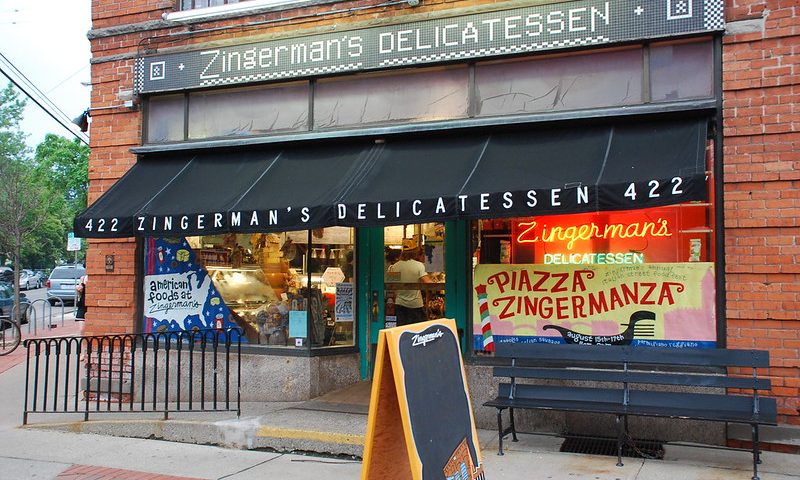
We need to start thinking more holistically about customer experience
March 23, 2020
Customer service, support and experience in the time of coronavirus
April 3, 2020How anarchy and Emma Goldman inspires one of the coolest companies in America – Interview with Ari Weinzweig of Zingermans
Today’s interview is with Ari Weinzweig is CEO and co-founding partner of Zingerman’s Community of Businesses, a gourmet food business group headquartered in Ann Arbor, Michigan, USA. Inc. Magazine described Zingerman’s as the “Coolest Small Company in America”. Meanwhile, they have been featured in the Harvard Business Review and on MSNBC for their business practices and Bo Burlingham in his book, Small Giants, cited Zingerman’s as a model for organizations that define success more creatively than just “getting as big as we can as fast as we can”. Ari joins me today to talk about what anarchy can teach us about leadership, culture and customer service, Emma Goldman, building a progressive business and what we should be thinking about when it comes to improving customer experience.
This interview follows on from my recent interview – We are moving from a ticketing age to a conversational age – Interview with Mads Fosselius of Dixa – and is number 336 in the series of interviews with authors and business leaders that are doing great things, providing valuable insights, helping businesses innovate and delivering great service and experience to both their customers and their employees.
Here’s the highlights of my chat with Ari:
- Ari studied Russian history at the University of Michigan with a particular focus on anarchists and anarchism.
- Zingerman’s is a community of businesses in the Ann Arbor area of Michigan.
- They have about a dozen businesses. Each is different and semi autonomous. They have about 700 employees in total, 18 managing partners and 200 staff or people that own a share in the businesses.
- Everything works and knits together based on what people like what they don’t like.
- There’s no formal definition of anarchism. It’s more of a philosophy.
- But, the common misconception is that it’s about bomb throwing, chaos and destruction.
- Anarchism is really just a positive belief in people. You know, the belief that everybody is a creative, intelligent, caring, human being who wants to do good things. And, the belief that hierarchy, while helpful in the moment from an operational standpoint, doesn’t make that person a better human being and it doesn’t necessarily mean they know the right answer.
- Anarchism is actually all about organization. It’s just that it involves the people who are part of the organization in designing the organization of which they are a part, rather than imposing it on them from some hierarchically removed place.
- Immanuel Kant described four different kinds of government:
- Law and freedom without force (anarchy)
- Law and force without freedom (despotism)
- Force without freedom and law (barbarism)
- Force with freedom and law (republic)
- Ari describes himself as a lapsed anarchist.
- People still need leadership and they still need structure.
- It’s just you can be an effective leader, but not think you’re a better person than the person you’re leading. And, you can still understand that the dishwasher has perspectives that are of value.
- Much of how Zingerman’s run their businesses is based on anarchist beliefs.
- Check out Independent Diplomat founded in 2004 by British former diplomat Carne Ross.
- Ari is particularly interested in the life, writings and work of Emma Goldman.
- J. Edgar Hoover once called her the most dangerous woman in America.
- She laid out some very interesting philosophical frameworks that he believes are totally applicable today.
- Here’s some insights and lessons from Emma Goldman (1869-1940):
- Remember that the means that we use, the way that we work every day and every interaction that we have needs to be congruent with the ends that we’re trying to achieve if things are really gonna work right.
- The human mind cannot endure sameness and monotony. Every sensitive being abhors the idea of being treated as a mere machine. The human being craves recognition.
- Ari believes that English anarchist Colin Ward captured this well when he once said (paraphrase) “society makes its morons and then despises them for it”.
- Work needs to be a positive experience for people.
- Emma Goldman in 1910:
“Our goal is the freest possible expression of all the latent powers of the individual, which is only possible in a state of society where man is free to choose the motive, work, the conditions of work and the freedom to work. One to whom the making of a table, the building of the house or the tilling of the soil is what the painting is to the artist and discovery to the scientist, the result of inspiration of intense longing and deep interest in work as a creative force”.
- Menlo Innovations do software design, but they’re very progressive in how they run their business. They came out with a book a couple years ago called Joy Inc.
- All of this is based on our beliefs.
- Emma Goldman understood that she was actually writing about beliefs. She actually wrote a pamphlet 125 years ago called What I Believe.
- She also understood that beliefs could be changed. She understood that beliefs are not genetic. And, she understood that our beliefs really need to be again congruent with the ends that we’re trying to achieve or we will fail.
- Carl Jung: “Until we make the unconscious conscious, it will control our lives and we will call it fate”.
- When it comes to people that are trying to build progressive business many are trying to be anarchists in nature, but the end up building a republic or some other form of government like the ones described by Kant because they can’t move away from the force bit.
- Our beliefs play out in the distinctions and differences that exist in how we interpret the word service, what it means to work in service and how we think about service positions and those people that work in service across different cultures and value systems.
- In the end it’s about how you treat the person next to you and how you treat yourself. Outside of politics, this is about how I treat the cashier at the supermarket, how I treat the dishwasher, how I treat my significant other.
- If everybody’s treating everybody with care, consideration and kindness, wouldn’t it be better?
- At Zingerman’s all of our meetings are open, so if you want to come then come right in.
- We have the belief that you have insight.
- Paul and I have been here for 38 years and we could try to have beginner’s mind but we don’t.
- We have what we call the Zingerman’s wide huddle. This is essentially, like a board of directors meeting or the top level managers meeting. Typically, you would have top 20 people and report to each other etc etc. But it’s open. So there’s 40 or 59 partners that show up at the meeting every month. And, sometimes their questions are better than the partners. Sometimes their insights are better than the partners.
- In operating this way we’re helping our people understand that leadership is not about certainty and never being afraid. It’s about being afraid and being uncertain and still making a decision to go forward together anyway.
- Zingerman’s three steps to great service:
- Figure out what the customer wants.
- Get it for them: accurately, politely and enthusiastically.
- Go the extra mile. These easy-to-follow standards set the table for our high level of service, whether it’s internal or external interactions.
- Zingerman’s five steps to handling complaints:
- Acknowledge the complaint
- Sincerely apologize
- Take action to make things right
- Thank the guest
- Document the complaint
- It’s a job performance expectation at Zingerman’s that everyone brings positive energy to work. They learned a lot on this from Anese Cavanaugh and her (intentional) energy management techniques.
- Ari’s Punk CX words: Be yourself
- Ari’s Punk CX brand: Zingerman’s themselves 😉 the folks at Corporate Rebels, Neals Yard Dairy and Brindisa.
About Ari
 Ari Weinzweig is CEO and co-founding partner of Zingerman’s Community of Businesses, which includes Zingerman’s Delicatessen, Bakehouse, Creamery, Catering, Mail Order, ZingTrain, Coffee Company, Roadhouse, Candy Manufactory, Events at Cornman Farms, Miss Kim and Zingerman’s Food Tours. Zingerman’s produces, sells and serves all sorts of full flavored, traditional foods in its home of Ann Arbor, Michigan to the tune of $65,000,000 a year in annual sales. Ari was recognized as one of the “Who’s Who of Food & Beverage in America” by the 2006 James Beard Foundation and has awarded a Bon Appetit Lifetime Achievement Award among many recognitions. Ari is the author of a number of articles and books, including Zingerman’s Guide to Better Bacon (Zingerman’s Press), Zingerman’s Guide to Giving Great Service, Zingerman’s Guide to Good Eating (Houghton Mifflin), Zingerman’s Guide to Good Leading, Part 1: A Lapsed Anarchist’s Approach to Building a Great Business, and Zingerman’s Guide to Good Leading, Part 2: A Lapsed Anarchist’s Approach to Being a Better Leader. Zingerman’s Guide to Good Leading, Part 3; A Lapsed Anarchist’s Approach to Managing Ourselves. Zingerman’s Guide to Good Leading, Part 4; A Lapsed Anarchist’s Approach to the Power of Beliefs in Business was released in summer of 2016. In 2017 Ari was named one of “The World’s 10 Top CEOs (They Lead in a Totally Unique Way)” by Inc. Magazine. In 2018 he released the pamphlet, “The Art of Business; Why I Want to be an Artist.” Another pamphlet, “Going into Business with Emma Goldman” came out in June, 2019.
Ari Weinzweig is CEO and co-founding partner of Zingerman’s Community of Businesses, which includes Zingerman’s Delicatessen, Bakehouse, Creamery, Catering, Mail Order, ZingTrain, Coffee Company, Roadhouse, Candy Manufactory, Events at Cornman Farms, Miss Kim and Zingerman’s Food Tours. Zingerman’s produces, sells and serves all sorts of full flavored, traditional foods in its home of Ann Arbor, Michigan to the tune of $65,000,000 a year in annual sales. Ari was recognized as one of the “Who’s Who of Food & Beverage in America” by the 2006 James Beard Foundation and has awarded a Bon Appetit Lifetime Achievement Award among many recognitions. Ari is the author of a number of articles and books, including Zingerman’s Guide to Better Bacon (Zingerman’s Press), Zingerman’s Guide to Giving Great Service, Zingerman’s Guide to Good Eating (Houghton Mifflin), Zingerman’s Guide to Good Leading, Part 1: A Lapsed Anarchist’s Approach to Building a Great Business, and Zingerman’s Guide to Good Leading, Part 2: A Lapsed Anarchist’s Approach to Being a Better Leader. Zingerman’s Guide to Good Leading, Part 3; A Lapsed Anarchist’s Approach to Managing Ourselves. Zingerman’s Guide to Good Leading, Part 4; A Lapsed Anarchist’s Approach to the Power of Beliefs in Business was released in summer of 2016. In 2017 Ari was named one of “The World’s 10 Top CEOs (They Lead in a Totally Unique Way)” by Inc. Magazine. In 2018 he released the pamphlet, “The Art of Business; Why I Want to be an Artist.” Another pamphlet, “Going into Business with Emma Goldman” came out in June, 2019.
Find out more at Zingermans.com, ZingTrain.com and Zingermanspress.com (You can also find many of the books at Google Books). Finally, say Hi to the folks at Zingerman’s and ZingTrain on Twitter @Zingermans and @ZingTrain and if you want to email Ari directly then his email is: ari at zingermans dot com.
Thanks to Adam Fagen for the image.




